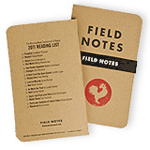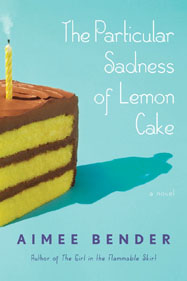-
March 24, 2011
Quarterfinals
-
Commentary by
Kevin Guilfoile & John Warner
-
Today’s Winner:
2The Particular Sadness of Lemon Cake
John: I’m always impressed with how willing our readers are to credit us with foresight when it comes to ToB matchups—for example, that we plan certain combinations because of thematic similarities (or differences), like our first-round pairing of Room and Bad Marie, two novels of adults and children, or when The Particular Sadness of Lemon Cake met Bloodroot, two novels with quasi-magical elements.
The truth, as we admitted in our opening-round recap, is that we put only the barest of thought into these things, sort of like a dog walking up to a basket of toys and deciding which one to chew on. Clearly, there’s some kind of process there, but you’d be hard-pressed to explain or understand it.
Which is why I’m embarrassed to admit that despite having read both of these novels, I never noticed the similarities between them that Kate Ortega identifies. Partly this may stem from the fact that family dysfunction plays a role in approximately 48.7 percent of all published novels (and 88.2 percent of all unpublished manuscripts). But reading Judge Ortega’s commentary causes me to reflect on the way books that tackle familiar things work on different readers.
 Buy anything from Field Notes from now until the end of the ToB and receive a special “reading list” memo book free, while they last. Use coupon code ROOSTER.
Buy anything from Field Notes from now until the end of the ToB and receive a special “reading list” memo book free, while they last. Use coupon code ROOSTER.My personal definition of literary art is that it’s a lot like polysyterene: If you try to get rid of it, it’s going to stick around for a long, long time—the difference being that art is non-toxic. In a gross oversimplification, I also believe there’s two broad paths to achieving this nondisposablility.
Path one is to render a story and world in a way that shows us things we never considered before, but nonetheless has the ring of truth. Here, I’m thinking of a novel like Edward P. Jones’s, The Known World, or one of last year’s competitors, The Book of Night Women by Marlon James. These are books whose subject matter is wholly outside my experience, and they manage to transfer that experience to the reader in a direct and undiluted way that, in technical literary theory terms, blows my doors off.
Path two is to tell the stories what the audience already knows in a way that detonates little explosions of recognition in the reader, the sense that indeed this is how life is lived, we just didn’t quite recognize it until we saw it put just this way.
These books are, I think, on path two for Kate Ortega, which makes the comparison closer than usual when it comes to the ToB. For her, Lemon Cake managed to hit those harmonic notes in a way Model Home didn’t. If I were judging, I’d go the opposite way. I think Model Home deserves some additional consideration for being painted on a larger canvas and for the way Puchner weaves in some insights about the macro-level economic and social forces at work as backdrop to the family drama. Commenter Kerry in the last round likened Puchner’s effort to Franzen’s, and I think that’s accurate, though it wears these things much more lightly, which is a virtue to my mind.
Bender is just further inside the experience of her character, right down to the molecular level, and I think this is where it won Kate over. I think for her Model Home signals family weirdness while The Particular Sadness of Lemon Cake embodies it, and for that reader at that time, it’s what she was looking for.
Kevin: Those little explosions of recognition (I love that) operate differently on everyone. They’re like the tiny detonations inside your car engine that move the pistons, little pops that throw switches either off or on for every reader, who, after all, brings as much varied experience to the novel as the author, and is wired just a little bit differently.
You and I talk in depth about books all the time (not just in this space every March) and our tastes are remarkably similar, but always nuanced, and our conversations inevitably reveal differences of degree. Eventually our conversations often become more about exploring those degrees than even the content of the books. We read for entertainment and we read to discover as much as we can about ourselves, but we fine-tune those observations when we talk about books. Knowing how I feel about a book and knowing what that feeling says about who I am are two different things.
And I think that is why book clubs and literature discussions and goofy projects like this one (and Infinite Summer, as well, just to name two I’ve been a part of) have only become more robust even as polls and sales continue to tell us that people in general are reading less and less (and especially less fiction). Because on a superficial, societal level it is easy to fill the time we used to spend reading with television or video games or Twitter and so on, but most of us need those little explosions of recognition, and we need some mechanism—some kind of bomb damage assessment—to figure out what they mean.
Which is all a way for me to say thank you to everyone who drops by here every day to see what all the popping and clicking is about. And although it’s obvious, I’ll say it anyway: The point of this thing is not to see who wins, but to see how much anybody cares.
John: Kafka said something like, “A book must be an ice axe to break the sea frozen inside us,” but maybe we can expand this notion further and say that a book is an ice axe to break the sea frozen between us.
Kevin: We’ll talk more about it tomorrow in our quarterfinal postmortem, but our semifinalists are set. Freedom will face A Visit From the Goon Squad and Next will square off against The Particular Sadness of Lemon Cake. The winners will take on a pair of previously eliminated books, as chosen by ToB fans and readers, for the rights to move on to the championship.
Speaking of which:
As of this matchup, Model Home goes out, and it appears that it will stay out as it was unable to crack the top two in our Zombie rankings. For now, Room and Skippy Dies are staying alive, or at least undead.
Kevin Guilfoile is the author of two acclaimed novels, Cast of Shadows and The Thousand, which have been translated into more than 20 languages.
John Warner’s novel, The Funny Man, will be released late September of this year by Soho Press. For the time being, he teaches at Clemson University.

















